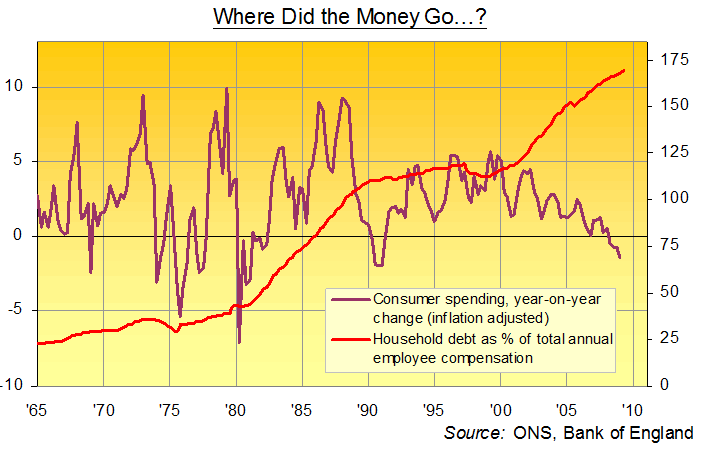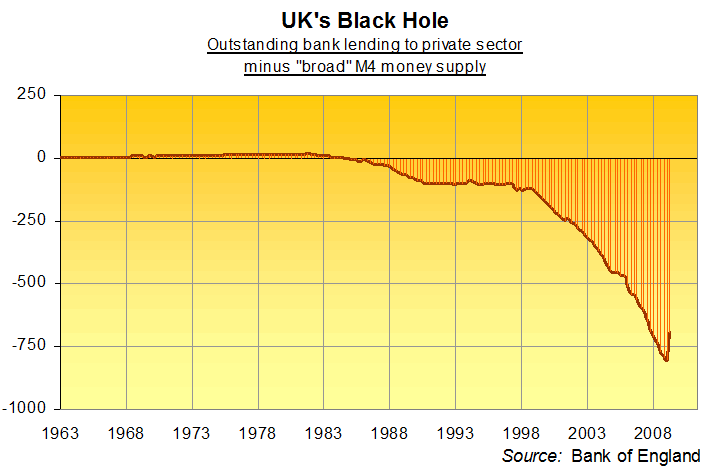Where Did All the Debt Go?, Economic Dark Matter Part2
Economics / UK Debt Sep 25, 2009 - 12:32 PM GMTBy: Adrian_Ash
 "A mere $400bn went missing in the UK debt-savings boom of 2000-2008. Not to worry..."
"A mere $400bn went missing in the UK debt-savings boom of 2000-2008. Not to worry..."
SEEMS WE'RE NOT the only ones trying to figure out this week where the last decade's record consumer borrowing went.
"Where did all the debt go?" asked Bank of England economist Spencer Dale in a speech this Thursday in Exeter. Sadly for US and British households, however, let alone savers and investors, he had fewer answers than even we do here at BullionVault.
"Household debt as a proportion of income increased from 100% to 165% in the 10 years to 2007," Dale noted of the United Kingdom. "[Yet] this big run up in debt was not used to finance a surge in spending," he added, as if taking his cue from our Wednesday essay, Economic Dark Matter, and scribbling his speech the next morning as the train crawled through Reading.
"Where did it all go?"

Where indeed...? Because as the chart shows, the surge in Britain's household debt ratio starting 10 years ago coincided with a marked slowdown in consumer spending growth.
In the US, the same picture...with personal indebtedness ticking higher from the same point in time, too. Which hardly seems fair. Just imagine! Borrowing a record multiple of gross income – fully 120% in the US by 2007...and a whacking 170% by the start of '09 here in the UK – just to ease up on discretionary spending.
"In fact, there was no such boom," Spencer Dale went on in this week's speech, pretty much quoting yours truly. But just like his policy-making predecessor, Stephen Nickell, five years before him, he thinks the missing billions – borrowed but not spent in the shops or malls – are explained away by "developments" in the housing market...
"House prices trebled in the ten years to 2007. And mortgage debts were accumulated to pay for the housing that had become so much more expensive. The conventional wisdom that the sharp increase in household debt was associated with the house price boom of the past decade is well founded."
So far, so good. The missing digit in our grand sudoku puzzle – that economic dark matter which forced consumers deep into hock without consumption soaring – lies in house prices. Right? Not quite, says Dale.
"What is less often appreciated is that much of that rise in household debt was matched by a comparable increase in the value of financial assets held by households."
Just like Nickell in late 2004, the Old Lady's man sees a matching asset to balance the debt. Borrowing here must equal new savings there. The volumes, though swollen, still equal each other. Net-net, we all got richer by taking on debt. That's why economists call it a balance-sheet, stupid!
Says Dale, "The value of housing assets purchased by households did increase, through additions and improvements to the housing stock. But the main counterpart to the rise in borrowing was increased saving."
How much more saving...?
"While households accumulated an additional £1 trillion of debt between 2000 and 2008, they also acquired over £750 billion of financial assets over the same period."
Huzzah! Some £250 billion – a mere $400bn, equal to 25% of both the total debt amassed over the period and also 25% of average annual GDP – went missing in the UK debt-savings boom of the early 21st century. Just think how bad the leakage would have got if no one was paying attention or understood what-in-the Simon Cowell was happening here.
Ah...ummmm...
Two points:
Adding value to real estate is not an absolute act. Measured against a dumb, useless lump of metal, for instance, the addition of electricity and clean running water to both the UK and US housing stocks did zilch between the Great Depression and the Great Inflation four decades later (see US House Prices in Gold). Granite work-tops surely count for much less;
On the other side of the ledger – the one that fails to balance debt growth by 25% remember – Dale doesn't say what those amassed "financial assets" are. Just like Nickell half-a-decade ago, nor does he cite his source for that grand figure...then put at 15% annually of net income...now set at £750bn over eight years.
Yet here, Dale notes, his figure for asset accumulation "does not include returns from these investments." Just what might that rate of return have been?
Perhaps those assets consisted of simply more property...now down by a fifth from the start of 2008. Or stock-market shares, perhaps...still one-third off their level of 2000 and increasingly foreign owned (35% in 2000; more than 40% foreign-owned by end-2006). Government gilts would have made a half-decent home for the cash gains of those "older households, trading down within the housing market" (as both Nickell and now Dale call them) who apparently got rich from the next generation's indebtedness. But here, as with equities, foreign ownership has risen this decade, not fallen thanks to some crowding out by property profits recycled into government bonds.
So where, oh where, did the money go?

Sitting here, four miles west of Threadneedle Street, we really don't pretend to know what's happened, happening, or will happen here.
All we can see at BullionVault is that the historic boom in household debt saw vast sums of money vanish from the data. And a little like losing sight of a shark, that makes us uneasy.
By Adrian Ash
BullionVault.com
Gold price chart, no delay | Free Report: 5 Myths of the Gold Market
City correspondent for The Daily Reckoning in London and a regular contributor to MoneyWeek magazine, Adrian Ash is the editor of Gold News and head of research at www.BullionVault.com , giving you direct access to investment gold, vaulted in Zurich , on $3 spreads and 0.8% dealing fees.
(c) BullionVault 2009
Please Note: This article is to inform your thinking, not lead it. Only you can decide the best place for your money, and any decision you make will put your money at risk. Information or data included here may have already been overtaken by events – and must be verified elsewhere – should you choose to act on it.
Adrian Ash Archive |
© 2005-2022 http://www.MarketOracle.co.uk - The Market Oracle is a FREE Daily Financial Markets Analysis & Forecasting online publication.



